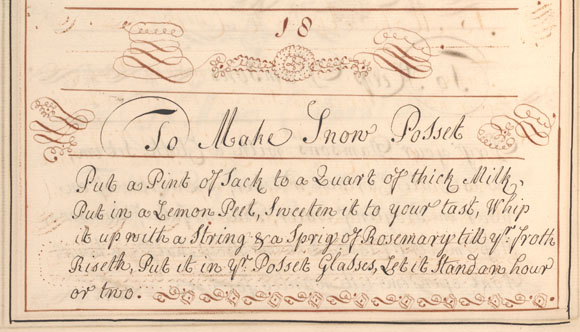December 5, 2011, by Fraser
5 December: Snow Posset
While it sounds like a Christmassy drink that wouldn’t look out of place alongside mulled wine or eggnog, a snow posset was originally concocted in the hope of alleviating minor ailments. Written in 1743 by Henrietta Harley, Countess of Oxford, the recipe for snow posset is primarily made from ‘thick milk’ with lemon peel to ‘sweeten it to your taste.’ It needs to be whipped up with a ‘sprig of Rosemary’ until the ‘froth Riseth’ prior to being left to stand for an hour or two.
This got us thinking about other weird and wonderful remedies and potions from Medieval times – and where a large glass of snow posset ranks on the weirdness-scale. That’s why we asked Dr Christina Lee, lecturer in Viking Studies at the University’s School of English Studies, to tell us more…
‘A posset is essentially a drink of hot milk curdled with alcoholic beverages such as ale, wine or liquors and seasoned with spices. There has been a long tradition of health-giving drinks, some of which make very good sense. For example, a fifteenth century recipe for ‘stinking mouth’ advises to seethe mint in good vinegar and to wash the mouth and gums with it. Others appear to be less sensible; for example, a person with fever is supposed to eat the slime of a cleaned slug or snail mixed with ‘woman’s milk’.
Although we know the names of individual doctors from the Anglo-Saxon period, most health care will have been administered by members of the community. Increasingly monasteries offered care, since they already possessed infirmaries for sick members.
Most of the early manuscripts of the so-called ‘leechbooks’ were collected in monasteries, which means that they contain a hotch potch of remedies, including rather bizarre recipes, such as for a woman who cannot carry a child to term and who is advised to take part of her own child’s grave, presumably the soil, wrap it into black wool, and sell it to traders. It is clear that then, as now, there were areas of life where conventional medicine failed.
While there is no mention of possets before the late Middle Ages, it is clear that medicinal drinks have a long history in England.’
Dr Lee is founder of the Disease, Disability and Medicine in Early Medieval Europe network and Director of the Institute for Medieval Research.
The Countess of Oxford’s recipe book is part of the Portland Literary Papers within the University’s extensive Portland Collection. All of the items featured in our e-Advent calendar are from the University’s historic library holdings, held in Manuscripts and Special Collections. For more information on the wide range of materials available, take a look at their website and blog or contact the curators on mss-library@nottingham.ac.uk.
![]()
Find out more about our Manuscripts development plans and how you can support us via the Impact Campaign website.


Hallo Dr Lee,
ich bin begeistert über die Erkenntnisse, die Sie in diesem Buch über frühere Rezepte gefunden haben. Meine Hochachtung!
Wolfgang Buthe
For those who don’t read German, Wolfgang Buthe’s comment above translates as “I’m excited about the insights that you have found in this book about past recipes. My respect!” (I hope that’s accurate!).
In view of my surname, I’m now heading home to whip up a quick posset using the family leechbook.
Lemon Posset is still going strong in Herefordshire. I had some at our recent work Christmas dinner at The Railway Inn, Dinmore
Advent calendar…
The full look of your web site is magnificent, let well as the content material!…